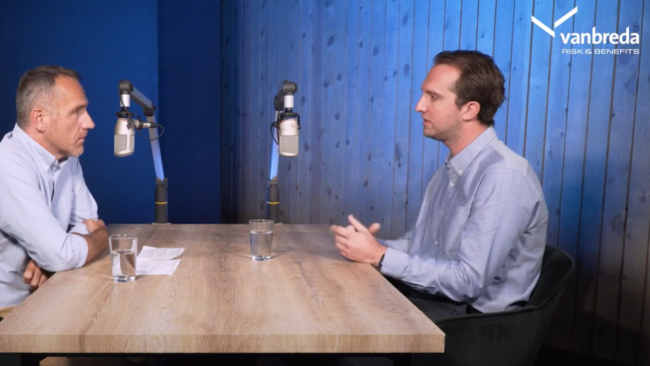The original recording of this video podcast is available in Dutch.
As a company in the transport and logistics industry, there are four typical risks for which you usually arrange an insurance solution:
- Your employees: in Belgium you are obliged to protect them against work accidents.
- Your fleet: you are required to arrange third-party vehicle insurance in this country, but you can also take out comprehensive insurance for all vehicles in the fleet.
- The precious cargo
that your drivers safely bring from point A to point B.
- Your liability as a company: your operating risk as a haulage company.
The liabilities of hauliers associated with activities other than pure transport (delivery of goods) tend to be overlooked as risks. Do you also offer additional services such as goods storage in your warehouse or handling processes such as repackaging or labelling? If so, make sure that this side activity is properly insured too, to avoid unpleasant surprises in the event of goods being damaged.
Making clear agreements at the start of the collaboration is vital in case damage occurs later on. Ideally, you should be able to refer to a written contract between you and your customer that delineates your liabilities clearly.
In practice, we see that major international players often impose high demands on logistics service providers. We therefore recommend that you carefully screen every contract in advance, so that you are aware of the liability risk you undertake with each assignment. Consult your broker in order to examine this critically, limit liability where possible and insure the residual risk appropriately.
With more than 10,000 companies employing a combined total of more than 200,000 people, the transport and logistics industry is one of the driving forces in our economy. In order to grow as a company, you obviously need to continue investing in such things as expanding your fleet or purchasing storage space. Investments involve new risks, which you can limit with appropriate insurance. In addition, insurance enables your company to survive after serious damage and allows you to get back to business as usual quickly.
Haulage companies are increasingly under pressure, partly as a result of two factors:
- Personnel: The current shortage of drivers is causing problems for many companies. Retaining and training personnel has become an extra point to consider. Regular training ensures that drivers can do their job optimally at all times, which is bound to reduce the risk of accidents. This is part of a sound prevention strategy.
- Digitisation: Payroll administration, stock management, communication with drivers – in the haulage industry as elsewhere, such things are increasingly taking place digitally. This is a positive development that saves a lot of time and manual effort, but how do you deal with the digital risks associated with it? For example, have you ever considered the impact of a cyber attack that shuts down your company for a few weeks?
We have developed a secure in-house platform, VanbredaConnect, on which customers can exchange information with us quickly and transparently 24/7.
Developments such as electric vehicles, hydrogen engines and LNG are all having impact on today’s haulage sector. Manufacturers and federations are actively investigating possible directions for innovation, but we have observed two different rates of progress:
- For light freight, the transition to electrification has already started, primarily for vans that deliver in cities where strict requirements are imposed.
- For the tractors and trailers used for heavy duty haulage, the transition has not started in earnest yet.





